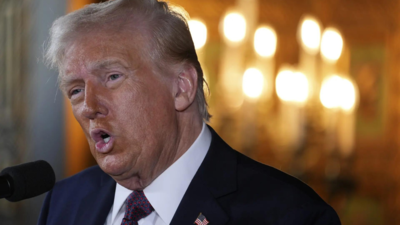US President-elect Donald Trump on Tuesday announced his bid to rename the Gulf of Mexico as the “Gulf of America” “pretty soon” after he takes charge in the Oval office.
“We’re going to be changing the name of the Gulf of Mexico to the Gulf of America,” Trump said.
“What a beautiful name. And it’s appropriate. It’s appropriate. Mexico has to stop allowing millions of people to pour into our country,” he added.
Trump asserted that the US does “most of the work there” and claimed the gulf “belongs” to America. The Republican leader added that an official announcement would come “at a future date pretty soon.”
Can Trump rename the Gulf of Mexico?
Soon after Trump’s remarks, Georgia representative Marjorie Taylor Green said in an Interview with a podcast that she would direct her staff to draft legislation to rename the Gulf of Mexico. Green said that she would take care of funding for new maps and administrative policy materials throughout the federal government.
Meanwhile, changing names of international waterbodies is not a unilateral decision and countries might not go along.
The International Hydrographic Organisation works to ensure all the world’s seas, oceans and navigable waters are surveyed and charted uniformly, and also names sone of them. There are instances where countries refer to the same body of water or landmark by different names in their own documentation.
It can be easier when a landmark or body of water is within a country’s boundaries. In 2015, then-President Barack Obama approved an order from the Department of Interior to rename Mount McKinley — the highest peak in North America — to Denali, a move that Trump has also said he wants to reverse.
There’s a long-running dispute over the name of the Sea of Japan among Japan, North Korea, South Korea and Russia.
South Korea claims that the current name wasn’t commonly used until Korea was under Japanese rule. At an International Hydrographic Organization meeting in 2020, member states agreed on a plan to replace names with numerical identifiers and develop a new digital standard for modern geographic information systems.
The Persian Gulf has been widely known by that name since the 16th century, although usage of “Gulf” and “Arabian Gulf” is dominant in many countries in the Middle East. The government of Iran threatened to sue Google in 2012 over the company’s decision not to label the body of water at all on its maps.
There have been other conversations about bodies of water, including from Trump’s 2016 opponent. According to materials revealed by WikiLeaks in a hack of her campaign chairman’s personal account, former secretary of state Hillary Clinton in 2013 told an audience that, by China’s logic that it claimed nearly the entirety of the South China Sea, then the US after World War II could have labeled the Pacific Ocean the “American Sea.”
How did the Gulf of Mexico get its name?
The body of water has been depicted with that name for more than four centuries, an original determination believed to have been taken from a Native American city of “Mexico.”
In 2012, a member of the Mississippi Legislature proposed a bill to rename portions of the gulf that touch that state’s beaches “Gulf of America,” a move the bill author later referred to as a “joke.” That bill, which was referred to a committee, did not pass.
The Gulf of Mexico, a body of water spanning over half a million square miles, has been recognized on European maps since the 1500s. Trump’s proposal to rename it has sparked criticism from historians and foreign policy experts, who note that such a move would likely face significant international backlash.
Mexican President Claudia Sheinbaum Pardo and outgoing Canadian Prime Minister Justin Trudeau have both spoken with Trump about his tariff threats in recent months. Neither leader has commented on the proposed renaming or merger suggestion, but political analysts predict that Trump’s statements could further strain North American relations.
With his inauguration just weeks away, Trump’s comments have set the stage for a contentious start to his administration.




